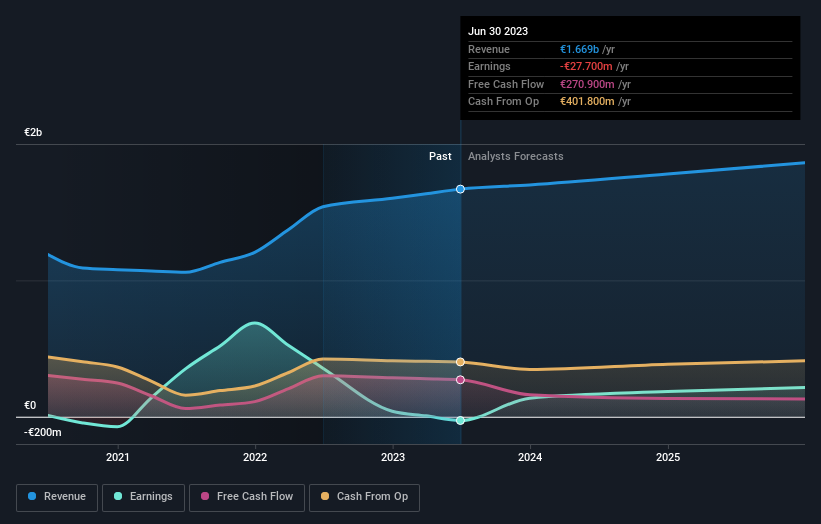Playtech plc's (LON:PTEC) recent 3.3% pullback adds to one-year year losses, institutional owners may take drastic measures
Key Insights
Significantly high institutional ownership implies Playtech's stock price is sensitive to their trading actions
The top 14 shareholders own 52% of the company
Every investor in Playtech plc (LON:PTEC) should be aware of the most powerful shareholder groups. With 49% stake, institutions possess the maximum shares in the company. In other words, the group stands to gain the most (or lose the most) from their investment into the company.
And so it follows that institutional investors was the group most impacted after the company's market cap fell to UK£1.2b last week after a 3.3% drop in the share price. This set of investors may especially be concerned about the current loss, which adds to a one-year loss of 27% for shareholders. Often called “market movers", institutions wield significant power in influencing the price dynamics of any stock. As a result, if the decline continues, institutional investors may be pressured to sell Playtech which might hurt individual investors.
Let's take a closer look to see what the different types of shareholders can tell us about Playtech.
Check out our latest analysis for Playtech
What Does The Institutional Ownership Tell Us About Playtech?
Many institutions measure their performance against an index that approximates the local market. So they usually pay more attention to companies that are included in major indices.
Playtech already has institutions on the share registry. Indeed, they own a respectable stake in the company. This suggests some credibility amongst professional investors. But we can't rely on that fact alone since institutions make bad investments sometimes, just like everyone does. It is not uncommon to see a big share price drop if two large institutional investors try to sell out of a stock at the same time. So it is worth checking the past earnings trajectory of Playtech, (below). Of course, keep in mind that there are other factors to consider, too.
Playtech is not owned by hedge funds. Albula Investments Fund Ltd is currently the largest shareholder, with 5.5% of shares outstanding. The second and third largest shareholders are Setanta Asset Management Limited and TT Bond Partners, Asset Management Arm, with an equal amount of shares to their name at 5.0%.
After doing some more digging, we found that the top 14 have the combined ownership of 52% in the company, suggesting that no single shareholder has significant control over the company.
Researching institutional ownership is a good way to gauge and filter a stock's expected performance. The same can be achieved by studying analyst sentiments. There are a reasonable number of analysts covering the stock, so it might be useful to find out their aggregate view on the future.
Insider Ownership Of Playtech
While the precise definition of an insider can be subjective, almost everyone considers board members to be insiders. Company management run the business, but the CEO will answer to the board, even if he or she is a member of it.
Most consider insider ownership a positive because it can indicate the board is well aligned with other shareholders. However, on some occasions too much power is concentrated within this group.
Our most recent data indicates that insiders own a reasonable proportion of Playtech plc. Insiders own UK£169m worth of shares in the UK£1.2b company. That's quite meaningful. Most would say this shows a good degree of alignment with shareholders, especially in a company of this size. You can click here to see if those insiders have been buying or selling.
General Public Ownership
The general public-- including retail investors -- own 32% stake in the company, and hence can't easily be ignored. This size of ownership, while considerable, may not be enough to change company policy if the decision is not in sync with other large shareholders.
Private Equity Ownership
Private equity firms hold a 5.5% stake in Playtech. This suggests they can be influential in key policy decisions. Some might like this, because private equity are sometimes activists who hold management accountable. But other times, private equity is selling out, having taking the company public.
Next Steps:
It's always worth thinking about the different groups who own shares in a company. But to understand Playtech better, we need to consider many other factors.
I like to dive deeper into how a company has performed in the past. You can access this interactive graph of past earnings, revenue and cash flow, for free.
But ultimately it is the future, not the past, that will determine how well the owners of this business will do. Therefore we think it advisable to take a look at this free report showing whether analysts are predicting a brighter future.
NB: Figures in this article are calculated using data from the last twelve months, which refer to the 12-month period ending on the last date of the month the financial statement is dated. This may not be consistent with full year annual report figures.
Have feedback on this article? Concerned about the content? Get in touch with us directly. Alternatively, email editorial-team (at) simplywallst.com.
This article by Simply Wall St is general in nature. We provide commentary based on historical data and analyst forecasts only using an unbiased methodology and our articles are not intended to be financial advice. It does not constitute a recommendation to buy or sell any stock, and does not take account of your objectives, or your financial situation. We aim to bring you long-term focused analysis driven by fundamental data. Note that our analysis may not factor in the latest price-sensitive company announcements or qualitative material. Simply Wall St has no position in any stocks mentioned.

 Yahoo Finance
Yahoo Finance 

